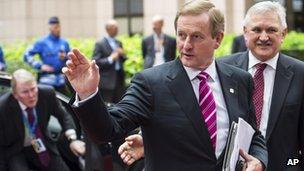Republic of Ireland growth in 2011 twice previous estimate
- Published

Irish Prime Minister Enda Kenny has been cutting spending to meet bailout conditions
The Republic of Ireland's growth rate last year was double previous estimates at 1.4% but this year started badly, official figures show.
The revision to the <link> <caption>2011 figures came after the final quarter of last year was shown to have grown 0.7%</caption> <url href="http://www.cso.ie/en/media/csoie/releasespublications/documents/latestheadlinefigures/qna_q12012.pdf" platform="highweb"/> </link> , rather than shrunk 0.2% as had been thought.
It means Ireland escaped technical recession last year - two consecutive quarters of negative growth.
But the economy shrank by 1.1% in the first three months of this year.
The figures were produced by the Central Statistics Office (CSO).
Ireland is struggling to get its economy back on its feet after it was forced to ask for an 85bn-euro (£67bn) bailout from the European Union and the International Monetary Fund in November 2010.
It has been cutting public spending and raising revenue.
A visit from the so-called <link> <caption>troika of officials overseeing the austerity programme - the European Commission, the European Central Bank and the International Monetary Fund</caption> <url href="http://www.imf.org/external/np/sec/pr/2012/pr12256.htm" platform="highweb"/> </link> - has just ended.
It was the group's seventh review of the country's economic programme and concluded the policy implementations are on track in what it called a "challenging environment".
In a sign of returning confidence, earlier this month the Irish government took its first tentative step back into private capital markets after two years, raising 500m euros in a small-sized issue of three-month bills.
The troika review mission said it had supported the country's return to the open market.
It concluded that there were specific problems affecting the economy, including household debt levels and unemployment, which it said was "unacceptably high".